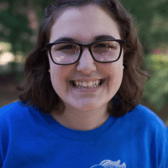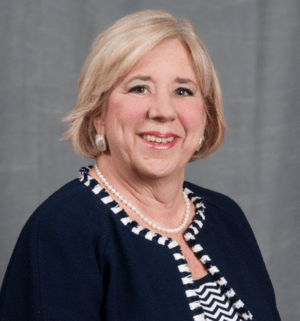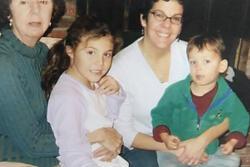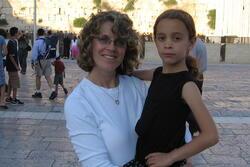Different Stories, Same Meaning
Arlene Fickler is a formidable woman. There’s a story that at the first board meeting after Arlene was elected president of my synagogue, someone asked the rabbi if there was a special blessing to say for a new leader. The rabbi apparently smiled and quoted from Fiddler on the Roof: “May G-d bless and keep the president far away from us.” Arlene is that kind of woman—not really ruthless, not really scary, but still impressive enough that it feels a bit wrong to not refer to her as “Ms. Fickler.” She cries a little bit at every b’nei mitzvah, even though female leaders aren't supposed to show emotion, but Arlene is clearly a woman in charge.
A longtime fixture in the Philadelphia Jewish community, Arlene has been president of our synagogue for the past four years, overseeing numerous changes in shul clergy, staff, and financial circumstances. She’s everywhere all the time, attending board meetings, giving announcements from the bima, schmoozing with congregants at services. Arlene has always been extraordinarily involved in our community, while also enjoying a successful law career. In addition to the several hours Arlene spends at the synagogue each week, she’s a partner in her law firm (focusing on complex commercial litigation) and until recently, she sat on many of the boards of Jewish community organizations in the Philadelphia area.
I’m giving you her resume because I’m amazed by it. When I sat down to interview her last month, I was expecting to hear that a woman like Arlene, who was one of just 32 women in her law school class of 230 people back in the 1970s, would attribute some of her success to the second wave of the feminist movement, or maybe would’ve even been part of it herself. When Arlene got her first job, women were just starting to enter the professional world in droves, beginning to consciously choose to remain unmarried or childless in order to stay career-focused, and creating comprehensive legal protections in the workplace. Nowadays it’s common for young feminists like me to be taught that the success of these women can always be traced back to involvement in the feminist movement.
Instead, when I asked about this, Arlene sort of shrugged. She went to Girl’s High in Philadelphia where girls were expected to be successful—everyone went to college, and about a quarter of the graduating class went to the University of Pennsylvania. Her older cousin had been one of only three women in her law school class, so her own situation was markedly better. “There was no sense [in the family] that we wouldn’t go to college,” Arlene said. “There was only a question of whether you would become a doctor, a lawyer, or a teacher.” Of her female friends and colleagues in her first years in a law firm, some of them were feminists in that they cared about “opening doors for women,” but they probably wouldn’t have described themselves that way. “We were achievers,” she explained. That’s all.
I was a bit stunned by this attitude. I’ve always regarded Arlene as a kind of feminist success story, both professionally and socially, the sort of woman who really could have it all. The idea that Arlene, as a woman of a certain age, didn’t regard her achievements as part of feminism’s triumphs was a huge departure from the narrative about working women that I’ve been fed all my life. In that story, (white, middle class) women entered the workforce in the 1970s only to encounter sexist bosses and policies, but thanks to a big dose of feminist gung-ho, they rose to the top of the corporate ladder anyway. (See the plot of Nine to Five for more of this). Arlene’s outlook, however, was a refreshing reminder that not all women have the same feminist experiences, and that retelling a single story about women’s success would be detrimental to what feminism is trying to do.
I don’t want to misrepresent Arlene—she’s worked for several decades to promote women in the legal and Jewish organizational worlds, and proudly identifies as a feminist today. But her early successes didn’t seem that out of the ordinary to her. She was the first girl in her South Philadelphia synagogue to have a bat mitzvah—this was in the early 60s—but her older cousin had had one too. “Nobody thought about the fact that at the time in the Conservative movement, women were not called to the Torah,” she said. “It just happened.” She grew up in an environment where women were expected to succeed, and so she “never had the perception that that wasn’t the case.” For Arlene, every door was open, and she never knew anything different.
Despite being born much later, my experiences growing up weren’t all that different from Arlene’s. I never knew that women were limited in what they could do until I stumbled onto some feminist blogs in middle school. I was prepared to join these women in their fight, but first I had to catch up on several millennia of negative messages about women’s abilities that my moms had shielded me from. I grew up in an intensely egalitarian feminist Jewish environment, where girls could do anything, and I just thought that was the way the world worked. Likewise, Arlene had two grandmothers and a mother, who she described as “strong women who believed in Judaism as the core of the family… I think it’s the soil in which I grew, and it’s what drives my perception of what Judaism is about, what family is about, what feminism is about.” Not every feminist’s story is the same, but it was wonderful to find out that that Arlene (one of my role models) and I share these perceptions that at the core, feminism and Judaism are about the communities we create and the beliefs we foster there. That we can have different experiences and still find similar meaning in our work to advocate and educate is what the feminist movement is all about. Arlene, please don’t cry when you read this.
This piece was written as part of JWA’s Rising Voices Fellowship.







